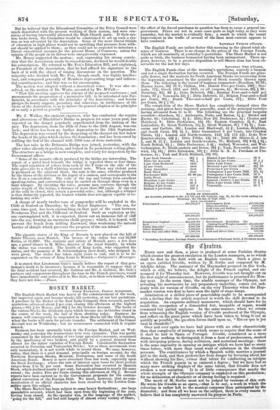(41 (*fru.
Every now and then, a piece is produced at some Parisian theatre which creates the greatest emulation in the London managers, as to which Every now and then, a piece is produced at some Parisian theatre which creates the greatest emulation in the London managers, as to which shall be first in the field with an English version. Such a piece is
an opera entitled Giralda, written by M. Scribe and composed by M. Adolphe Adam. The manager of the Haymarket pounced on this work,
which is still, we believe, the delight of the French capital, and an-
nounced it for Thursday last. However, Giralda was not brought out on the first night of announcement, but its performance is promised for Mon- day next. In the mean time, the nimble manager of the Olympic, not revealing his movements by any preparatory underline, comes out Bud. denly with his version of Giralda, on the very Thursday when the Hay- market version was first to have seen the light of stage-lamps.
Admiration at a skilful piece of generalship ought to be accompanied with a feeling that the article acquired is worth the skill devoted to its
acquisition. An exquisite military manteuvret which should have for its
result the occupation of a dismantled fort, incapable of repair, would command but partial applause. In the same manner, when we return
from witnessing the English version of Girakla produced at the Olympic, and reflect on the great pains which have been taken to bring it out as quickly as possible, the question forces itself upon us, "Est-ce quo le jeu vaut la chandelle ?"
Over and over again we have had pieces with no other eharacteristic than that complexity of intrigue which seems to require that the scene of
it shall be laid in Spain or Portugal. Giralda, considered as a mere
drama, has nothing to distinguish it from a host of predecessors, stocked with intriguing princes, daring militaircs, and nocturnal meetings : there is the same ingenuity in opening an intrigue which we have had so many times before with more than usual want of substance in the dramatis personte. The contrivances by which a Spanish noble marries a peasant girl in the dark, and then protects her from danger by hovering about her without showing his face, evince that talent for conducting an intrigue which the French possess in so eminent a degree ; but we have bad so
many more striking displays of the same talent, that Giralda does not awaken a new sensation. It is of little consequence that nearly the whole strength of the Olympic company is employed on this production; for no delineation of character or of strong feeling is required. The merit of M. Scribe must not be judged by versions of this sort. He wrote his Giralda as an opera,—that is to say, a work in which the colouring is rather left to the musical composer than anticipated by the dramatist ; and from all we hear on the subject, there is every reason to believe that it has completely answered its purpose in Paris.


























 Previous page
Previous page